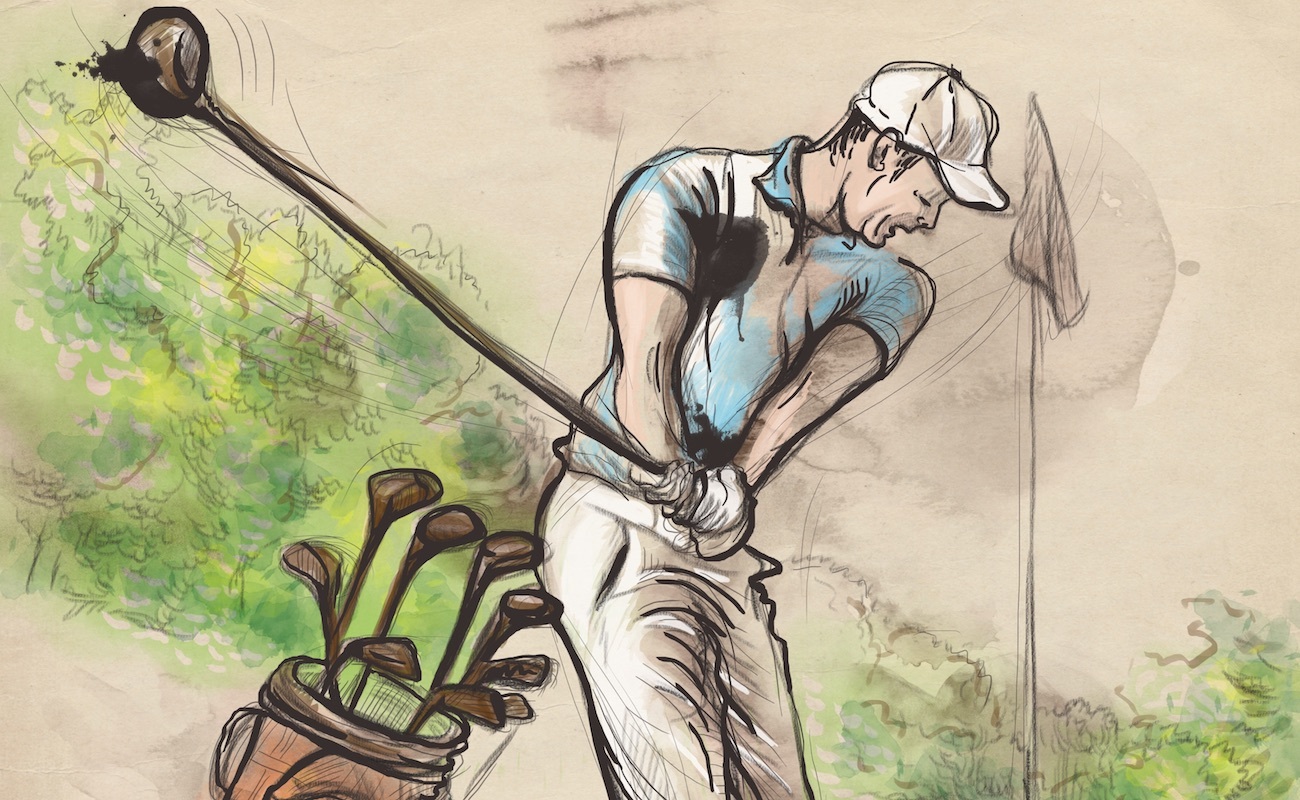Sign up for our daily newsletter
Latest news, reviews, analysis and opinion, plus unmissable deals for bunkered subscriptions, events, and our commercial partners.
Cast your mind back to September 2018 and the chaos of the finale to the PGA Tour’s Tour Championship at East Lake. Tiger Woods was mobbed by fans in the middle of the 18th fairway as he looked to wrap-up his first victory in five years.
With thousands breaking through barriers in scenes reminiscent of a Hollywood fairy-tale comeback, Woods had every excuse to get lost in the moment. Instead, he looked as steely-eyed as ever as he marched to the green as if in a world of his own, whilst everybody around him was losing their minds with excitement.
Asked afterwards how he managed to keep it together, he said: “The tournament wasn’t over yet.”
Woods’ physicality has been dissected and discussed at length for years and, as we know, has given rise to a new breed of tour player.Yet now, going by what seems to be happening at grassroots level, it’s not just the muscles that are being primed for tour life: it’s the brain, too.
Right now, talent levels are at an all-time high and mini tours are seemingly bursting at the seams with young pros all fighting for their spot on the big stage. Last year, there were 11 first-time winners on the PGA Tour. This year is just over half-way done and we’re already at 12.
Being the best isn’t easy, it seems.
• Meet the club that’s fighting prostate cancer
• Can you identify these courses from Google Earth?
“The mind runs the body,” says Nicola Ellwood, a Master Coach (MSc MAC) Master NLP Practitioner and Certified Trainer and a contributor to bunkered for the last two years. Ellwood describes herself as a “mental skills and performance coach” and says, these days, if you haven’t got the complete package, you might as well not turn up.
“At the top level, you’ve got to be physically strong, fit and powerful, but you’ve also got to be mentally strong, fit and powerful,” she says.
“Nowadays, golf isn’t just a technical game. The mental and the physical work the technical. If you’ve got negative thoughts, you’re not going to perform. I’ve spoken to a lot of coaches about this and, at that level, it’s the difference that makes the difference. It’s that mental skill that will determine first or second place.”
Ellwood isn’t a psychologist. She works with the unconscious mind as well as the conscious mind. “A traditional psychologist will not do that,” she says when pointing out the difference with Neuro Linguistic Programming (NLP).

“Traditional golf psychology is more of an understanding – but many psychologists are training themselves in NLP because they recognise the transformational power of it and the change it brings.”
So what, exactly, is NLP and why the fuss? Ellwood says it’s becoming more mainstream because it gives you a better understanding of how we create our thoughts and then creates change, fast, through working with the unconscious.
“NLP is the study of ‘what works’. It’s ‘how’ we do what we do. But rather than just an understanding of what’s going on in someone’s mind, it gives someone a self-awareness on how to change their own mind very quickly. NLP utilises all your internal resources.”
• Where will the men’s majors be played in 2020?
NLP, however, isn’t ‘recognised’ in the same way as ‘traditional’ psychology. There is no evidence-based research around it, something that can be complicated to measure anyway. “It is mostly anecdotal,” she says, “but those anecdotes are extremely transformational.”
Ellwood, who is based in Lincoln, has worked with around 40 golfers, but what might be surprising to some is the work she is now doing with young, wannabe tour players. One such player is Sam Done, a 21-year-old amateur from Lincolnshire who made his England debut this year.
• QUIZ – Is it a golf club or a rock band?
The Kenwick Park player has dreams of being a tour player but realised his temper might be holding him back. For one so young to recognise the consequences of such an issue is impressive – but to act on a fix is quite different.
Through his coach at his club, Paul Spence, Done found himself sitting down with Ellwood and talking about his wants and desires. Eighteen months later, he’s seeing results.
“Paul has coached me since I was young and has drip-fed into me that ‘You need to think this way’ and so on. He’s tried to get me into a good mind-set so I can perform at my best. Paul has completed a basic course in NLP, but he’s nowhere near as qualified as Nicola.”
The big question is this: why would a teenager have any interest in speaking to someone about ‘mind’ matters? In truth, it seems the lure of the pro game is so strong that every advantage needs to be taken, at whatever age. Done was just mature enough to see his problems and face them.
“When I was on the course, I would basically lose the plot. I would get angry, maybe break a club, slam a club, and that wasn’t good for me or my clubs.”
• Heather MacRae: Facing cancer, fighting back
He says each outburst didn’t look good and would take three or four holes to get over the episode. That led him to worrying about what selectors would think when they saw him.
“It began to affect my golf,” he says honestly. “I spoke to my parents and they said they thought it would be good for me, both on and off the golf course.”
• gWest – The great enigma of Scottish golf
Done says Ellwood gets him “thinking the right way” and says their get-togethers give him a better understanding of why he thinks the way he does. A few years ago, most practise work would be technical, with time spent on the range – but he says members of England Golf squads are now busy in the gym, thinking more about their diets and working on their mental game.
“Think about it. If your body is your engine, why would you put junk in it? That’s the big thing with Nicola. The physical, the mental and the technical side all have to perform.”

Teens working on their mental game seems to be a new thing, yet Done isn’t surprised by the trend.
“In the old days, if you were good at golf then you’d be fine. But that’s not enough anymore. I want to give [being a tour pro] a go. There’s a lot of hard work involved and, however good you are, it’s not in the stars. You’ve got to keep working.
“Regarding the mental side, it’s definitely growing in the amateur game. I don’t think there are too many that are having it at an early age, but it is definitely growing.
“You watch someone like Henrik Stenson. You would not know what mood he was in, whether he’s made an eagle or a double bogey. That constant line of a mental state is huge. Tiger Woods gets really animated, but once the shot’s gone and that ten-yard line that he talks about has been passed, he’s back to himself and in his bubble.”
According to Ellwood, Done is a “feeler”. He has to feel the shots. Her work with him made her realise that, for him, it’s all about how his hands feel, how his body moves, his emotions, so his pre-shot routine is physical and ‘state’ based.
“When I work with a player, I find out specifically, within their mind, where they create their best performance. It’s not a technical ‘thing’ with their swing. None of us are wired the same. I tune into what works for the individual.”
• The best Scots course you’ve (probably) never played
US analyst Brandel Chamblee has always championed the power of the mind and believes it’s a requirement these days, even more so in an era where every aspect of a young player’s game is scrutinised.
“People with really funky golf swings, if they make it to the tour, they have to be so mentally tough at a young age to resist the temptation to give in to conformity,” he said. “They have a golf swing that wks… and then they have the mental toughness from having to deal with all the scorn and questions and scrutiny. You put those together and that’s a hell of a combination for longevity.”
• This feature first appeared in issue 173 of bunkered. For our latest magazine subscription offer, click here
ALL ABOUT THE MASTERS
More Reads

The bunkered Golf Course Guide - Scotland
Now, with bunkered, you can discover the golf courses Scotland has to offer. Trust us, you will not be disappointed.
Find Courses









